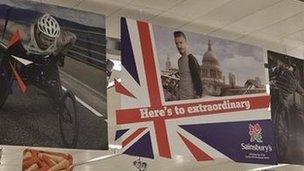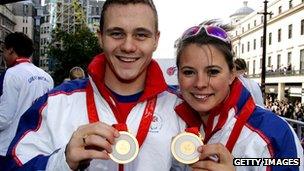Paralympics open up business opportunities
- Published

Sainsbury's have adopted 70 Paralympians and will promote them across stores in the UK
Do the Paralympics have sufficient reach and interest to make it a useful commercial proposition for a company to sponsor them?
All the main sponsors of the London 2012 Olympic Games, such as Adidas, Visa and McDonald's, are automatically involved with the subsequent Paralympics.
However, the British supermarket chain Sainsbury's was not involved with the main event, yet it is a major sponsor of the Paralympics.
Clearly, the retailer thinks the Paralympics are not just an add-on to the main event, but that they are important in their own right and there is a commercial benefit in being associated with them.
Chief executive Justin King says the build-up has been tremendous.
"We know from the response of our customers that there is an enthusiastic public engagement with the Paralympics," he says.
"Our colleagues and customers have enthusiastically embraced what the games stand for," he says.
"It has fulfilled everything we hoped for it. Almost all of our colleagues are supportive of the idea that we're involved," he adds.
Equal acceptance
Sport for athletes with an impairment has been around for more than 100 years, according to the International Paralympic Committee. The Paralympics were first held in Rome in 1960.
Over the following half century, they have gradually acquired a higher public profile, with an increasingly enthusiastic audience.
And where there is an audience, there are business opportunities - including sponsorship.
The British swimmer Liz Johnson already has one gold and one silver medal from previous Paralympics, and she believes companies are more prepared to offer sponsorship because of the higher profile the Paralympics now have.

Sam Hynd and Liz Johnson with the Olympic medals they won in Bejing in 2008
"For the first time ever Paralympians have been included alongside Olympians, so I think they have realised we are really athletes too," she says.
But does her sponsorship help the profile of the businesses she is associated with?
"Everybody loves success - as athletes we are successful, that is why they have chosen us," she says.
"It is not easy, you don't just wake up with the ability to win a gold medal, so the highs and the lows of what we have gone through really reflect similar circumstances they have within a business or a project."
Liz Johnson herself has faced many challenges, and she points to 2004 when she was doing her A-levels and driving 900 miles a week to get to training, and 2008 in Beijing, when she was striving to get a gold medal when her mother passed away with cancer.
"Everybody can relate to those stories and put things into perspective and think whatever life throws at you, there is always a way around it," she says.
"Every four years the games become more elite and gain more respect because we are seen as elite athletes with a disability, rather than disabled athletes who do sports," she adds.
Wider message
The emotional tales of human courage and dedication are part of the attraction of watching an athlete conquer adversity, but wouldn't Sainsbury's have achieved more of a commercial impact if they were associated with the likes of Usain Bolt or Mo Farah?
"No, we don't see it that way," says Mr King.
"One could argue that if you are an Olympics sponsor, then you're fighting in pretty crowded territory.
" Most people would probably only be able to name one or two or three of the many Olympic sponsors.
"Companies that sponsor Olympics do it for their own reasons. The Olympics has spectacular international reach like no other event," he says.
"But for us, being the first and indeed only Paralympic exclusive sponsor, focusing on the messages at a local level in our stores has been by far the better proposition for our business."
Although Sainsbury's spends about £3bn ($4.8bn) sourcing products abroad, its core business is in the UK and even though it will continue to support the British athletes, it is unlikely that they will have the same level of input when the next Paralympic Games are held in Rio de Janerio in 2016.
"I am sure there is a Sainsbury's equivalent in Brazil that will be looking on at what we've done and perhaps they will do the same," he says.
It has evidently been a good commercial decision for Sainsbury's to be involved with the London 2012 Paralympic Games, but Mr King says there are other issues to consider.
"There is the wider Paralympic message," he says.
"It isn't about disability per se, it's about individuals, whatever their challenges, being the best they could possibly be."
- Published15 August 2012
- Published15 September 2011